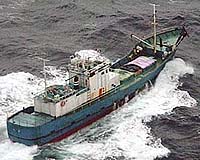 |
Taipei (AFP) Aug 17, 2009 Typhoon Morakot has hit Taiwan's agriculture and tourism sectors hard, but the overall impact on the economy -- already reeling from the financial crisis -- may be limited, experts said. The island was struggling with possibly its longest recession yet when the typhoon struck on August 8, unleashing floods and mudslides that President Ma Ying-jeou has warned may have left up to 500 dead. The estimated economic impact rose to 110 billion Taiwan dollars (3.4 billion US dollars) at the end of last week, including destroyed homes, crops and infrastructure, Premier Liu Chao-shiuan told reporters. The Cabinet is expected to submit a special budget to parliament this week to cover disaster relief and reconstruction, he said. Agriculture and tourism sectors bore the brunt of the typhoon damage, Mars Hsu, an analyst with Grand Cathay Securities said. "However, because those two sectors do not make up a big share of Taiwan's gross domestic product, the negative impact on Taiwan's economic activity is not expected to be as severe as some may fear," he said. The damage from the past nine days may lead to Taiwan's GDP contracting an additional 0.53 percentage points in the third quarter, according to a forecast by SinoPac Holdings. For the whole year, the typhoon could lead to an extra 0.13 percentage point fall from the original forecast of 2.5 percent annual fall, the finance firm said in a research note. The forecast pales in comparison to the 10.24 percent contraction Taiwan's economy suffered in the first quarter when the island's exports plummeted. Other recovering sectors should offset most of the typhoon's losses, Alex Huang of Mega International Investment Services said. "Every sign, including exports and trade surplus, indicates the domestic economy has been turning for the better," he said. Taiwan's economy had been expected to climb out of recession in the fourth quarter as exports recover, the semi-official Chung-Hua Institution for Economic Research think tank said in an earlier report. Agricultural losses so far amount to at least 12.2 billion Taiwan dollars (372 million US dollars), according to the Council of Agriculture. But that figure was rising daily and is expected to approach the 18.8 billion in losses caused by Typhoon Herb in 1996, the worst agricultural disaster in Taiwan's history. Tourism will suffer as Alishan, or Ali Mountain -- a popular destination for Asian tourists -- and other famous nature reserves in the mountainous southern regions were badly damaged by flooding and mudslides, Hsu said. More than 100 million Taiwan dollars in hotel and restaurant facilities were wiped out and it could take up to two years for key infrastructure to be restored, the China Post reported Monday. The area's railway could take up to a year to repair at a cost of 800 million Taiwan dollars, the Liberty Times reported. However, the fact that the typhoon hit remote mountain regions and not Taiwan's industrial heartland helped insulate the export-oriented economy, Hsu said. "Unlike the earthquake in 1999, as Taiwan's major industrial parks remain intact during the typhoon, the export sector should go unaffected," he said. The 7.6-magnitude quake, the deadliest natural disaster in the island's history, claimed around 2,400 lives and seriously damaged several industrial parks, including the Hsinchu Science-based Industrial Park in the north. In the meantime, some industries like steel, cement and construction may benefit from the natural disaster as the president has vowed to return people's lives back to normal as soon as possible, Hsu said. Share This Article With Planet Earth
Related Links Farming Today - Suppliers and Technology
 China needs to adapt for new EU rules on illegal fishing: study
China needs to adapt for new EU rules on illegal fishing: studyBeijing (AFP) Aug 17, 2009 China, the world's leading exporter of marine fish products, needs to adapt its fisheries if it is to meet new EU regulations to combat illegal fishing, according to a report released Monday. Under the legislation which comes into force in January 2010, all fish materials imported into the European Union will have to be accompanied by catch certificates validated by the nation under whose ... read more |
|
| The content herein, unless otherwise known to be public domain, are Copyright 1995-2009 - SpaceDaily. AFP and UPI Wire Stories are copyright Agence France-Presse and United Press International. ESA Portal Reports are copyright European Space Agency. All NASA sourced material is public domain. Additional copyrights may apply in whole or part to other bona fide parties. Advertising does not imply endorsement,agreement or approval of any opinions, statements or information provided by SpaceDaily on any Web page published or hosted by SpaceDaily. Privacy Statement |